|
|
|
Sort Order |
|
|
|
Items / Page
|
|
|
|
|
|
|
| Srl | Item |
| 1 |
ID:
163793


|
|
|
|
|
| Summary/Abstract |
This article explores the efforts of Japan and Australia to enhance the naval
capability of third countries—specifically the Philippines—threatened by the
rise of China. Considered as middle powers, both countries are members of two
associations of maritime democracies, namely: the Democratic Security Diamond
(DSD), and the Quadrilateral Security Dialogue (QUAD). Since the formation
of their special strategic partnership, Japan and Australia have jointly assisted in
building up the capabilities of the Philippine Navy (PN), Philippine Coast Guard
(PCG), and the Philippine Air Force (PAF). The recent dramatic shift in Philippine
foreign policy direction fosters this triangular security relationship. On the one
hand, President Rodrigo Duterte, in distancing the Philippines from the United
States (the country’s traditional ally) favors closer security ties with Japan and
Australia. On the other hand, Japan and Australia want to prevent the Philippines
from gravitating closer to China’s orbit of influence and power. Gradually, however,
this development can either modify or erode the American hub-and-spoke system of
alliance in East Asia and increase the spoke-to-spoke links leading to the creation of
minilateral and plurilateral security arrangements in the Indo–Pacific region.
|
|
|
|
|
|
|
|
|
|
|
|
|
|
|
|
| 2 |
ID:
185268
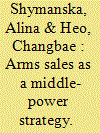

|
|
|
|
|
| Summary/Abstract |
This article examines Israel’s sales of advanced arms and technology as a middle-power foreign policy tool. By way of doing so it discusses the nature and characteristics of this policy, as well as its various components, and assesses the extent of its success in achieving its goals. It concludes that despite Washington’s occasional opposition to its arms export policies, Israel’s strategy has proved highly successful and can serve as a model for middle powers seeking to improve their status and prestige in the contemporary international system.
|
|
|
|
|
|
|
|
|
|
|
|
|
|
|
|
| 3 |
ID:
178353


|
|
|
|
|
| Summary/Abstract |
To date, marine genetic resources (MGR) have proven to be the most controversial aspect of the package deal structure of the ongoing negotiations of a legally binding instrument for the conservation and sustainable use of biodiversity beyond national jurisdiction (BBNJ). This has led to a proliferation of scholarly work characterizing the debate on MGR along developed and developing state lines. By applying middle power international relations theory to the Australian delegation’s conduct in MGR negotiations, this article aims to challenge the developed/developing state narrative. As such, it advocates a more nuanced approach to understanding state motivation in multilateral treaty negotiations pertaining especially to complex issues such as MGR.
|
|
|
|
|
|
|
|
|
|
|
|
|
|
|
|
| 4 |
ID:
184768
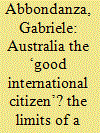

|
|
|
|
|
| Summary/Abstract |
Australia is often described as a ‘good international citizen’ (GIC), which is intertwined to its status of ‘quintessential’ middle power. However, a number of elements might undermine both notions. This research reviews the concept of GIC and contributes to this niche of IR theory by providing a dedicated definitional framework, which consists of: i) the respect of the international law; ii) multilateralism; iii) the pursuing of humanitarian and idealist objectives; iv) an active support for the rules-based order; and v) a congruous identity matched by consistent domestic policies. After assessing the country’s foreign and domestic policies against this, it finds that Australia has damaged its GIC credentials due to a number of reasons, including: the hard-line policies against seaborne asylum seekers; the participation in missions that are not sanctioned by the UN; the transformation of its global multilateralism into a selective regionalism; the budget cuts to foreign aid; a controversial attitude towards climate change mitigation; and a preference for the US-led global order over a rules-based international society. Far from criticising the country’s foreign policy in its entirety, it argues that in the 21st century Australia behaves as a ‘neutral international citizen’, and a traditional but not ‘quintessential’ middle power.
|
|
|
|
|
|
|
|
|
|
|
|
|
|
|
|
| 5 |
ID:
137449


|
|
|
| 6 |
ID:
173187
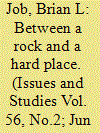

|
|
|
|
|
| Summary/Abstract |
“Middle powers,” variously defined, have served relevant and significant roles in the post-WWII regional and global orders, facilitated by structural conditions of “long peace” among great powers and proactive leadership by and among creative middle powers. Within the complex Asia-Pacific security order, “middle powers” such as Australia, Canada, and South Korea have had the “space” to engage the non-like minded and advance multilateralism with security guarantees from the US. However, Beijing and Washington today are eliminating this space and its associated choices for middle-power diplomacy by increasingly characterizing their rivalry as a confrontation of “existential threats” between incompatible “civilizations” and securitizing trade and technology. China and the US are each selectively ignoring or purposely eroding key aspects of a rules-based international order. This paper highlights the dilemmas of South Korea, Australia, and Canada, middle powers who have found themselves individually and collectively “stuck” facing contradictory global and regional policy choices.
|
|
|
|
|
|
|
|
|
|
|
|
|
|
|
|
| 7 |
ID:
190654
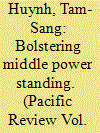

|
|
|
|
|
| Summary/Abstract |
South Korea's reluctant response to the U.S. Free and Open Indo-Pacific (FOIP) strategy so far has failed to send a clear-cut signal to regional countries. Despite upholding multilateralism as the cornerstone of its middle power diplomacy, South Korea has not worked in line with Indo-Pacific second-size powers given Seoul's relatively vague response to the Indo-Pacific structure. With foreign policy shifts from Trump to Biden, South Korea may be well-positioned to communicate its policies with a more nuanced response to the Indo-Pacific. To leverage Seoul's middle power standing and its commitment to multilateralism, the Moon Jae-in administration can be expected to reflect on clearer definitions of what 'Indo-Pacific' means and come up with a more comprehensive understanding of multilateral cooperation in the region so as not to mistake 'Indo-Pacific' for its security connotation. As for South Korea, pursuing a three-headed strategy, for example, continuing to position itself in the Indo-Pacific region as a balancer, enhancing ties with like-minded middle powers, and deepening the South Korea-ASEAN relationship, could accommodate Seoul's interests and concerns amid the U.S.–China strategic competition and the COVID-19 pandemic.
|
|
|
|
|
|
|
|
|
|
|
|
|
|
|
|
| 8 |
ID:
165145
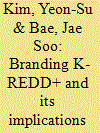

|
|
|
|
|
| Summary/Abstract |
The need for new and stronger middle power diplomacy is growing as global challenges are increasingly governed by various horizontal inter- and trans-national networks. Climate change is one of the most complex and urgent global challenges that require collective action, and it is an issue for which more middle power leadership is greatly needed. The Republic of Korea (ROK) has been successful in becoming a primary actor in green growth governance, and its success has been attributed to its strategic middlepowermanship, integrating both material and ideational contents. Reducing emissions from deforestation and forest degradation (REDD+) in tropical developing countries has been lauded as an immediate and effective solution to mitigate climate change. ROK's unique history of forest transition before rapid economic growth highlights the fact that improving forest management is possible even with imperfect governance, rapid population growth, and low economic development. The lessons learned from ROK's forest transition can be developed as a distinct contribution to the international effort to address forest-related impacts on climate change, and offer an important opportunity for ROK to play a constructive role and achieve enhanced stature within the international community.
|
|
|
|
|
|
|
|
|
|
|
|
|
|
|
|
| 9 |
ID:
054470
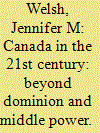

|
|
|
| 10 |
ID:
121221
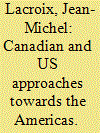

|
|
|
|
|
| Publication |
2012.
|
| Summary/Abstract |
The purpose of this article1
is to envisage the evolution of the relations
between Canada and the United States with their southern neighbours,
with the objective of comparing the respective attitudes of the two North
American partners vis-à-vis Latin America. Under the administration
of George W. Bush, anti-Americanism intensi?ed worldwide. Nothing
comparable occurred in the case of Canada: as a middle power with a legacy
of peacekeeping initiatives in its recent past, it naturally came to be perceived
in a more positive way. This difference led many to wonder whether Canada
might be contemplated, in the Americas as elsewhere, as representing
somehow a "more acceptable" version of the US. Or at least it did so until
the past few years, during which time it has been said that the elections of
Stephen Harper in 2006 and of Barack Obama in 2008 have brought about
a shift in the two countries' "images." This article seeks to test this claim,
with special reference to the relations of each with Latin America.
|
|
|
|
|
|
|
|
|
|
|
|
|
|
|
|
| 11 |
ID:
106273
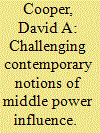

|
|
|
| 12 |
ID:
138094
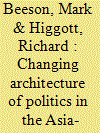

|
|
|
|
|
| Summary/Abstract |
Middle power theory is enjoying a modest renaissance. For all its possible limitations, middle power theory offers a potentially useful framework for thinking about the behavior of, and options open, to key states in the Asia-Pacific such as South Korea, Japan and Australia, states that are secondary rather than primary players. We argue that middle powers have the potential to successfully implement ‘games of skill’, especially at moments of international transition. Frequently, however, middle powers choose not to exercise their potential influence because of extant alliance commitments and the priority accorded to security questions. We substantiate these claims through an examination of the Australian case. Australian policymakers have made much of the potential role middle powers might play, but they have frequently failed to develop an independent foreign policy position because of pre-existing alliance commitments. We suggest that if the ‘middle power moment’ is to amount to more than rhetoric, opportunities must be acted upon.
|
|
|
|
|
|
|
|
|
|
|
|
|
|
|
|
| 13 |
ID:
102123


|
|
|
| 14 |
ID:
187476
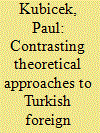

|
|
|
|
|
| Summary/Abstract |
This article introduces a Special Issue dedicated to applying international relations theories to Turkish foreign policy. More specifically, it contrasts structural or neo-realist approaches with ideational or constructivist ones, suggests general strengths and shortcomings in each, and briefly suggests how both might apply to TFP. It also introduces the eight substantive articles in the Special Issue.
|
|
|
|
|
|
|
|
|
|
|
|
|
|
|
|
| 15 |
ID:
163930


|
|
|
| 16 |
ID:
129902


|
|
|
|
|
| Publication |
2014.
|
| Summary/Abstract |
This article considers the role of new middle powers in the climate change debate. We focus on the issue of "green growth." We argue that new middle powers such as South Korea are increasingly proactive in promoting this green growth agenda and, as a result, challenging conventional realist and liberal approaches and expectations to new middle powers. This diplomacy is aiming to bridge states, great and small, by leading to strategic breakthroughs in the current climate change negotiation deadlock. The article discusses South Korea's green growth initiative and identifies how this initiative affects South Korea's middle power role in the global environmental debate with respect to its inclusion in the Environment Integrity Group and its initiative the Global Green Growth Institute (GGGI).
|
|
|
|
|
|
|
|
|
|
|
|
|
|
|
|
| 17 |
ID:
161609
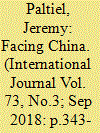

|
|
|
|
|
| Summary/Abstract |
This paper examines the challenges Canada faces in forging a diplomacy appropriate for the changing power configuration in global politics. The reshaping of the international order—with China pushing for a more hierarchical view of international relations, and the administration of Donald Trump repositioning the USA in global politics—provides Canada with the impetus to rediscover the traditional role that middle powers played as reliable middle managers for the global project. Today, such “middle management” is deprived of a reliable role. Since China has yet to articulate a coherent normative vision of a new global order, and the USA is retreating to a purely transactional view of trade and diplomacy, Canada and other middle powers have few choices other than to try to adapt to the changes in the hopes of sustaining the normative mesh that has upheld the post-war order.
|
|
|
|
|
|
|
|
|
|
|
|
|
|
|
|
| 18 |
ID:
132075


|
|
|
|
|
| Publication |
2014.
|
| Summary/Abstract |
South Korea's diplomatic and security focus has inevitably been on northeast Asia and its difficult relationship with its northern neighbour, but South Korea also has a role to play in the broader Asian Pacific region. This article analyzes South Korea's increasing economic, political, and cultural links with the wider region, in particular with Southeast Asia, and its role in the development of Asian Pacific regionalism. Utilizing the concept of "middle power," it argues that, while clearly South Korea cannot ignore what is happening in its immediate geographical environment of North-east Asia, it does have the economic and political resources to enable it to take advantage of the opportunities for greater interactions with other parts of the Asian Pacific region, particularly Southeast Asia, if the political will exists.
|
|
|
|
|
|
|
|
|
|
|
|
|
|
|
|
| 19 |
ID:
164776
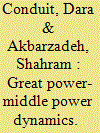

|
|
|
|
|
| Summary/Abstract |
Iran is expected to be one of the main beneficiaries of China’s Belt and Road Initiative (BRI). China and Iran had a track record of cooperation long before the announcement of BRI, developing a highly asymmetric Great Power-Middle Power partnership over the course of three decades. This article asks whether BRI will enable China and Iran to transcend the limitations faced by most Great Power-Middle Power relationships on the basis of Iran’s enhanced strategic economic and geographic value. It is argued that while BRI could benefit from stronger China–Iran ties, Iran’s international posturing has proven a significant hindrance to China, highlighting that entrenched patterns of engagement in Great Power-Middle Power relations are not easily shifted, even in the face of immense economic incentives.
|
|
|
|
|
|
|
|
|
|
|
|
|
|
|
|
| 20 |
ID:
152343
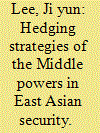

|
|
|
|
|
| Summary/Abstract |
Many middle powers in East Asia—particularly South Korea and Malaysia—are affected by the strategic relationship between the USA (hereafter the USA) and China. Therefore, I would like to examine the strategic behaviors of the middle powers in East Asia from a hedging strategy perspective. The hedging strategy extends the logic of the traditional balance of power theory while maintaining a strong emphasis on structural incentives, which critics have found lacking in the soft balance approach. Most East Asian states have calibrated their security measures and strategies in response to the changing US-China relationship. The purpose of this article is to compare the hedging strategies of South Korea and Malaysia, which are middle powers, that affect the East Asian security order. This article, thus, aims not simply to explain specific instances of the hedging strategies of middle powers but also, based on this theoretical foundation, to establish a new frame of analysis for the hedging strategies of middle powers through objective and critical assessment.
|
|
|
|
|
|
|
|
|
|
|
|
|
|
|
|
|
|
|
|
|